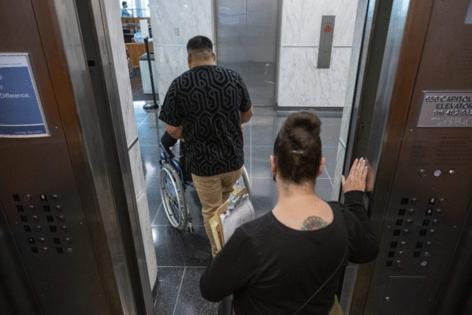Immigrants contest Northern California courthouse arrests, detention conditions
Published in News & Features
Lawyers for undocumented immigrants detained after attending mandatory hearings on their cases asked a federal judge in Northern California on Monday to certify their lawsuit as a class action and order the federal government to improve conditions at its San Francisco detention facility.
The immigrants sued the Trump administration in September, challenging courthouse arrests in San Francisco, Concord and Sacramento. They also alleged that detainees were forced to sleep on the floor in cold, dirty rooms with fluorescent lights on all night and without access to warm blankets, clean clothes, medical care or hygiene products.
“Defendants literally drag people from partway through their immigration proceedings into ‘Hold Rooms’ built only to accommodate short-term arrest processing of less than twelve hours, and then they incarcerate people in these ill-equipped rooms for days on end,” attorneys for The Lawyers’ Committee for Civil Rights Under Law said in their motion before U.S. District Judge P. Casey Pitts in San Jose federal court.
In Sacramento, at least 39 people were arrested during or after their court hearings, some dragged weeping away from family members and some violently thrown against walls by masked agents, according to a filing in the case.
Most of the hearing before Pitts on Monday involved technical discussion of the law regarding class-action lawsuits and conditions in detention facilities, including how long people were detained at the short-term holding areas adjacent to immigration courts.
Marissa Hatton, a lawyer for the immigrants, said the facilities were designed for brief detentions and until recently had not been used to hold people longer than 12 hours.
But with the administration detaining large numbers of people in immigration sweeps, existing detention centers lacked space, and short-term facilities were being used to hold detainees for several days. At the U.S. Immigration and Customs Enforcement holding area at 630 Sansome St. in San Francisco, migrants were detained without access to showers, towels or toothbrushes, she said.
She argued that the immigrants who are suing should be named as a class by Pitts, so that others facing detention will be eligible for any relief or protections that the judge orders. In June, the U.S. Supreme Court limited judges’ ability to issue universal injunctions in cases where numerous people might be impacted by a government policy or other condition, but did leave open the door to address problems faced by numerous people through the use of class action lawsuits.
Under federal law, Hatton said, civil detainees — including undocumented immigrants — must be held under conditions that are not punitive. That standard, she noted, is higher than what is required in criminal incarceration, where inmates are provided with clean clothes, blankets, beds and other necessities.
A separate hearing on the legality of the courthouse arrests will be held on Dec. 9. If Pitts certifies the class and issues a stay against the courthouse arrest policy, it would apply to the entire country, Nisha Kashyap, Hatton’s co-counsel, said in an interview.
But Assistant U.S. Attorney Douglas Johns argued that the migrants involved in the lawsuit all had somewhat different experiences with their detention, and therefore should not be eligible to be certified together as a class.
He also argued that because the plaintiffs were either out of detention under a different order by Pitts, or already deported, their cases should be considered moot, or no longer relevant.
Pitts posed sharp questions to attorneys for both sides. He seemed skeptical of the government’s argument that the cases were moot because the plaintiffs were no longer at the detention facility.
And he has already questioned the practice of courthouse arrests, saying in an earlier order in the same case that the detention of a woman who was leaving her court hearing was part of “a now-familiar practice that courts in this district have consistently held is likely unconstitutional.”
But Pitts also pressed Hatton and Kashyap, on their contention that all detainees held at the San Francisco facility be certified as members of the lawsuit class regardless of how long they are held there.
He indicated that he was considering certifying the class for purposes of the lawsuit, but in a narrower way than the immigrants’ attorneys wished.
Because the motion included allegations of unconstitutional treatment, Pitts said he expected to rule soon. He did not issue a decision Monday.
“There’s a lot of issues I need to think through,” Pitts said. “I think this warrants some careful consideration.”
____
©2025 The Sacramento Bee. Visit at sacbee.com. Distributed by Tribune Content Agency, LLC.







Comments